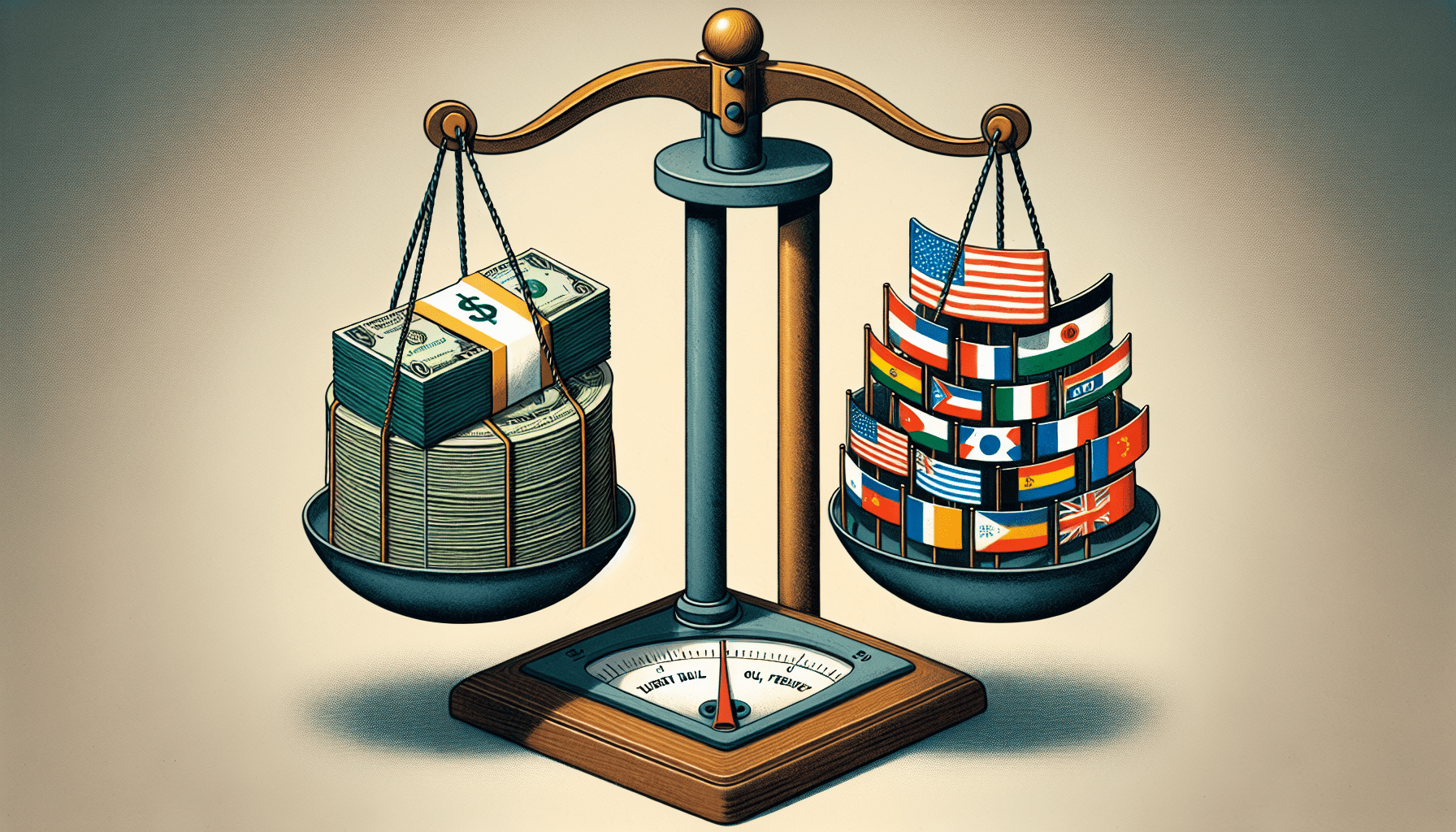In this article, we will explore an intriguing question that often arises in discussions about the US economy: what percentage of the US national debt is held by foreign countries? It is a topic of great interest and importance, as it not only sheds light on the United States’ financial dependency but also highlights the influence that other nations hold over its economic stability. So, let’s embark on this journey together and uncover the fascinating truth behind the US national debt and its global implications.
Understanding the US National Debt
Definition of national debt
The national debt of the United States refers to the amount of money that the federal government owes to creditors, including individuals, institutions, and other countries. It is the cumulative total of the government’s borrowing over time and is used to finance various expenditures such as infrastructure projects, social programs, and national defense.
How the national debt of US is accumulated
The national debt of the US is accumulated through the sale of government securities, such as Treasury bonds, notes, and bills, to investors. When the government needs to borrow money, it issues these securities, which are essentially promises to repay the principal amount plus interest at a later date. Investors, both domestic and foreign, purchase these securities, providing the government with the necessary funds. Over time, the accumulation of these securities contributes to the national debt.
The current status of the US national debt
As of [date], the US national debt stands at [current debt amount], comprising a significant portion of the country’s Gross Domestic Product (GDP). The debt has been steadily increasing over the years due to various factors like government spending exceeding revenue, economic downturns, and financial crises. The magnitude of the national debt is a matter of concern for policymakers as they strive to balance the need for necessary spending with the goal of reducing the debt burden.
Foreign Ownership of US National Debt
Meaning of foreign ownership of national debt
Foreign ownership of the US national debt refers to the portion of the debt held by individuals, institutions, and foreign governments outside of the United States. It represents the extent to which other countries have invested in US government securities.
Reasons for foreign countries buying US debt
Foreign countries buy US debt for various reasons. One primary motive is the perceived safety and stability of US Treasury securities. The United States has a long-standing history of meeting its debt obligations, providing foreign investors with a secure place to park their excess reserves. Moreover, the US dollar serves as a global reserve currency, further increasing the demand for US government securities. Additionally, by investing in US debt, foreign nations establish economic and political ties with the United States, potentially bringing about diplomatic benefits and opportunities for collaboration.
Percentage of US National Debt Held by Foreign Countries
Current percentage of US national debt held by foreign countries
As of [date], approximately [percentage]% of the US national debt is held by foreign countries. This indicates the significant role played by international investors in financing the debt burden of the United States.
Historical trends in foreign ownership of US debt
Foreign ownership of US debt has fluctuated over time. In the past, the proportion of debt held by foreign nations has both increased and decreased, influenced by factors such as economic conditions, global events, and government policies. Understanding these historical trends provides insights into the changing dynamics of international finance and the global economy.
Significant Foreign Holders of US Debt
Top countries owning US debt
Several countries hold a substantial amount of US debt. As of [date], the largest holders include [country 1], [country 2], and [country 3]. These nations have consistently invested significant sums in US government securities and remain key stakeholders in the US national debt.
Changes over time in which countries hold the most US debt
The composition of foreign holders of US debt has undergone shifts over time. While some countries have maintained their positions as dominant holders, others have reduced their debt holdings or increased their investments. Factors contributing to these changes can range from shifts in economic power, policy decisions, and international relations dynamics.

China’s Holding of US Debt
Current status of China’s holding of US debt
China is currently one of the largest holders of US debt. As of [date], China holds approximately [percentage]% of the total US national debt. China’s significant investment in US Treasury securities is a result of its desire to diversify its foreign exchange reserves, maintain a strong trading relationship with the United States, and mitigate currency risks.
Political implications of China’s position as a significant holder of US debt
China’s sizable holding of US debt has political implications. As a major creditor, China has leverage over the United States, potentially influencing policymaking and bilateral relations between the two nations. Moreover, any fluctuations or shifts in China’s holdings can impact global financial markets and provoke geopolitical tensions.
Japan’s Holding of US Debt
Current status of Japan’s holding of US debt
Japan is another significant holder of US debt. As of [date], Japan holds approximately [percentage]% of the US national debt. Japan’s investment in US government securities allows it to maintain a close economic relationship with the United States while leveraging the stability of the US dollar for its own economic interests.
Economic implications of Japan’s position as a dominant holder of US debt
Japan’s dominant position as a holder of US debt has economic implications. It provides Japan with a secure investment avenue for its surplus funds and a means to control fluctuations in exchange rates. Additionally, the substantial debt holdings strengthen economic ties between the US and Japan, fostering cooperation in various sectors and facilitating capital flows.

Impact of Foreign Ownership of US Debt
Influence on US economy
Foreign ownership of US debt has a significant impact on the US economy. It allows the government to finance its spending and manage its debt obligations. However, reliance on foreign investors can also have drawbacks, such as increased vulnerability to changes in global economic conditions, potential foreign control over US fiscal policy, and the risk of sudden sell-offs leading to destabilization of financial markets.
Influence on international relations and global economy
The level of foreign ownership of US debt influences international relations and the global economy. The interdependency created through debt holdings fosters connections between nations, both politically and economically. The financial stability and reputation of the United States impact the confidence of investors worldwide, influencing trade relationships, diplomatic ties, and geopolitical dynamics.
US Government Response to Foreign Ownership
Government strategies to manage foreign ownership
The US government employs various strategies to manage foreign ownership of its debt. This includes closely monitoring foreign investors’ actions, engaging in regular dialogues and consultations, and working towards maintaining stable economic relations with key creditor nations. Additionally, the government may implement policies and regulations to safeguard national interests and mitigate potential risks arising from high levels of foreign ownership.
Actions to reduce vulnerability due to a large proportion of foreign owners
To reduce vulnerability arising from a large proportion of foreign owners, the US government may take steps to diversify its investor base, encourage domestic investment, and enact measures to reduce the overall debt burden. By fostering a more balanced debt portfolio and reducing reliance on foreign creditors, the government aims to strengthen its economic independence and ensure greater long-term stability.

Future of Foreign Ownership of US Debt
Predictions for future trends in foreign ownership
The future trends in foreign ownership of US debt are subject to various factors, including changes in global economic dynamics, shifts in geopolitical alliances, and domestic policy decisions. Experts predict that foreign ownership may continue to play a significant role in financing the US debt but anticipate potential shifts in the composition of creditor nations.
Potential implications of changes in foreign ownership
Changes in foreign ownership can have wide-ranging implications. Shifts in creditor nations may impact the US dollar’s stability, market confidence in US securities, and global financial markets. Furthermore, changes in foreign ownership can influence bilateral relations, diplomatic dynamics, and the economic landscape, both domestically and internationally.
Analyzing the Risks of Foreign Ownership of US Debt
Potential dangers and vulnerabilities
Foreign ownership of US debt presents several risks and vulnerabilities. These include the potential for a sudden sell-off by foreign investors, which could lead to currency fluctuations, destabilize financial markets, and impact interest rates. Additionally, high levels of foreign ownership may compromise the independence of the US economy and fiscal policy decision-making.
Ways to mitigate those risks
To mitigate risks associated with foreign ownership of US debt, policymakers can focus on prudent fiscal management, reducing the debt burden, and diversifying the investor base. Greater transparency and communication with foreign stakeholders can help maintain trust and minimize market volatility. Additionally, fostering domestic economic growth and reducing reliance on external financing can enhance the resilience and sovereignty of the US economy.
In conclusion, understanding the US national debt and its foreign ownership is crucial to comprehending the dynamics of the global economy and international relations. The significant role played by foreign countries in financing the US debt highlights the interconnectedness of nations in an increasingly globalized world. While there are both benefits and risks associated with foreign ownership, proactive measures and strategic decision-making can help navigate this complex landscape while ensuring economic stability and preserving national interests.


